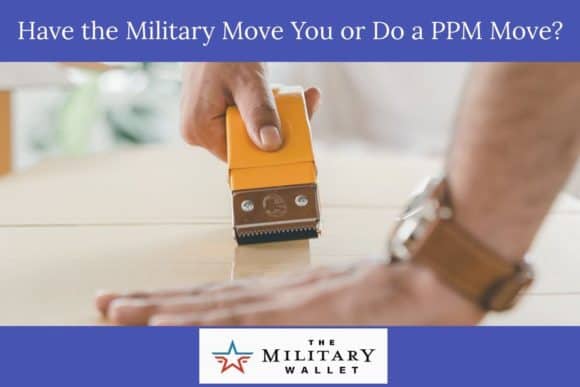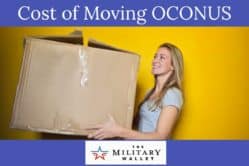Table of Contents
Once you get orders to PCS to a new duty station, one of the first decisions you must make is whether you will move yourselves in a PPM or let the military move you. Whenever a service member moves on PCS orders, the military will pay for a professional moving company to pack, move and unpack all your goods. Each service member has a weight allowance based on rank and whether they have dependents.
A service member may choose to opt-out of the professional moving company’s services and move themselves. This was formerly called a Do-it-Yourself (or DITY) move. It is now referred to as a Personally Procured Move, or PPM. Some service members and their families may also choose to do a partial-PPM move, in which they opt to move some of their belongings but have the military-provided moving company move everything else.
On one hand, a PPM gives military families an opportunity to save lots of money and have more control over their moving process. On the other hand, allowing the military to move you takes a lot of work and stress off the family, which can be particularly helpful during a deployment or a pregnancy. Different moves may be better for you at different times in your career, depending on your family size, children’s ages and the amount of stuff you need to move.
Let’s explore the pros and cons of moving yourself as a military family.
The Benefits of PPM, AKA Moving Yourselves
You’ll Save Money
When you do the work yourselves instead of hiring a moving company, the military lets you keep most of the funds. Many people pocket a large amount of cash when they move themselves. However, you will need to take some steps to maximize your profits. Be sure to save all your receipts from buying moving boxes, renting a moving van or buying gas. You will be reimbursed by the weight and by the miles between duty stations.
You Make Your Own Timeline
Taking charge of your move means you don’t waste time waiting for movers to arrive. You can start packing weeks ahead of time, if you wish. You will have all your goods with you when you arrive at the next duty station, so you won’t have to wait weeks for them to arrive.
Less Chance of Broken or Stolen Things
No one is going to take better care of your things than you are. If you’re worried about theft or damage, then moving yourself allows you to keep everything in your sight the entire time. With that said, you should read up on professional moving tips, so you don’t accidentally break all your china or let the TV fall over.
You Won’t Accidentally Pack Trash or Pets
We have all heard horror stories of movers who packed up dirty pizza boxes, bags of trash or even live pets into the moving boxes. When you move yourself, you know what not to pack. You don’t need to place signs on the baby saying, “Do not pack!”
The Problems with PPMs
It’s a Lot of Work
There’s nothing like a move to make you realize how much stuff you own! If you’re moving out of your first apartment, it might not be so bad. If you have several young children, however, moving yourself is a nightmare. If you live in a building with no elevator and tight staircases . . . you might want to hire a moving company.
You’ll Need Friends to Help
Moving furniture requires strength and patience. It helps if you have some equipment like a dolly and moving straps. It also helps if you can convince friends to lend a hand. You may need to bribe them with a beer, home-cooked meal or even cash. But bribing friends is still cheaper than hiring professionals. If you plan to do it all on your own or with your spouse, you may soon discover that you aren’t up to the challenge.
You Aren’t a Moving Professional
There’s a reason people pay for professional moving companies. They work fast, they are strong and they take apart or disassemble furniture all day long. They know a few tricks about how to safely pack breakable items like dishes, picture frames and keepsakes. They also know what size box to use for different items so that the boxes don’t get too heavy. And watching them selectively load a truck is like watching a game of Tetris. Yes, you may be able to learn some of these things by reading articles online or through basic trial and error. But that’s a risk you take when you move yourself.
You Have to Drive a Moving Van . . . Everywhere
You don’t need a special license to drive a rental moving truck. However, they are large and can be very inconvenient in certain situations — gas stations, fast food restaurants, parking garages, suburban neighborhoods, etc. If you were planning to do some sight-seeing while you move to the next location, having a moving van is a huge inconvenience. Also, if you plan to split up while one person drives the moving truck and the other person drives your personal vehicle, then realize that one of you will be driving alone with the kids and/or pets for the entire trip.
Now that you know the pros and cons of PPMs, you should be able to decide which style of move is best for you and your family.
Pros
- You’ll save money.
- You can move on your timeline.
- You have more control over your belongings.
- You know what to pack and what to leave behind.

Check your VA Home Loan eligibility and get personalized rates. Answer a few questions and we'll connect you with a trusted VA lender to answer any questions you have about the VA loan program.
Cons
- It’s a massive amount of work!
- You may need help from friends or coworkers.
- Moving supplies can be expensive.
- You may need to hire help for large, heavy or bulky items.
- You have to drive the moving van.




About the comments on this site:
These responses are not provided or commissioned by the bank advertiser. Responses have not been reviewed, approved or otherwise endorsed by the bank advertiser. It is not the bank advertiser’s responsibility to ensure all posts and/or questions are answered.